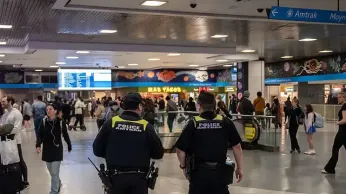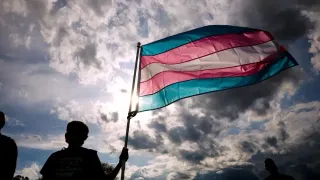
4 hours ago
NYPD’s Penn Station Crackdown Sparks Entrapment Outrage
READ TIME: 3 MIN.
A surge in arrests at New York City’s Penn Station has ignited concern and debate within the LGBTQ+ community, as police intensify efforts to curb so-called “gay cruising” in the transit hub’s men’s restrooms. Since June, nearly 200 men have been detained in what many advocates and legal experts are calling a discriminatory crackdown that risks reviving harmful patterns of entrapment and profiling .
According to reports, these arrests often involve plainclothes officers who initiate or solicit illegal activity, a method widely recognized as police entrapment . Entrapment, defined as law enforcement inducing an individual to commit an offense they would not have otherwise committed, is viewed by many as a dangerous misuse of police authority—particularly when used to police consensual acts among adults.
“Undercover operations should not be a pretext to target and criminalize gay men simply for seeking connection,” said a spokesperson from the New York City Anti-Violence Project . “We have seen the devastating personal and community-wide harm these tactics cause, especially given the long history of LGBTQ+ people being subjected to surveillance and selective enforcement.”
The LGBTQ+ community has a fraught history with law enforcement, particularly regarding surveillance and entrapment in public spaces. Incidents such as the Stonewall Riots of 1969 were sparked by police crackdowns on LGBTQ+ gathering spots, and for decades afterward, sting operations routinely targeted gay and bisexual men in public restrooms and parks .
Despite major legal and cultural advances, including the decriminalization of same-sex relationships and the legalization of marriage equality, these recent Penn Station arrests are a stark reminder that old policing patterns remain a pressing issue.
LGBTQ+ rights groups are urging city officials and the NYPD to reconsider the allocation of police resources. Instead of focusing on the criminalization of consensual activity, advocates argue that addressing Penn Station’s legitimate safety concerns—such as violent crime, homelessness, and lack of accessible health services—would better serve the entire community.
“Criminalizing consensual behavior does nothing to make Penn Station safer,” said a representative from Lambda Legal . “It perpetuates fear, stigma, and marginalization—particularly among those who are already vulnerable.”
The Anti-Violence Project has called for transparency about the NYPD’s operations and for the establishment of community oversight to ensure LGBTQ+ people are not unfairly targeted .
Civil liberties organizations have raised concerns that these operations may infringe upon constitutional rights, including protections against unreasonable search and seizure. Legal experts point out that entrapment defenses are notoriously difficult to prove in court, often leaving those arrested with criminal records and lasting personal consequences .
“Police sting operations in public spaces have a chilling effect on LGBTQ+ people’s sense of safety and belonging,” said a legal analyst with the American Civil Liberties Union . “We need to ensure that public safety efforts do not come at the expense of civil rights.”
Local LGBTQ+ organizations are mobilizing to provide legal aid, counseling, and support to those arrested. Hotlines and legal clinics have seen an uptick in requests for assistance, as many fear public exposure, job loss, and family rejection .
Meanwhile, advocacy groups are emphasizing the importance of sex-positive, harm-reduction approaches to public health and safety. “We urge the city to invest in outreach, education, and community-based solutions, rather than punitive crackdowns,” said a policy director at GMHC (formerly Gay Men’s Health Crisis) .
The controversy in New York comes amid broader national debates about the policing of LGBTQ+ people in public spaces. In recent years, similar crackdowns have occurred in cities such as Los Angeles, Dallas, and Miami, often accompanied by community backlash and calls for reform .
Experts warn that these incidents risk undermining hard-won progress, particularly at a time when anti-LGBTQ+ rhetoric and legislation are on the rise in several states .
In response to mounting criticism, NYPD representatives have stated that their operations are intended to address public complaints and enhance overall safety at Penn Station . The department says it is reviewing its policies and has agreed to meet with LGBTQ+ advocacy organizations to discuss community concerns.
“We are committed to serving all New Yorkers with dignity and respect,” an NYPD spokesperson said in a statement, adding that the department would “work collaboratively with community partners to address specific issues while safeguarding civil rights” .
LGBTQ+ leaders and allies continue to call for genuine dialogue and policy change. They emphasize the need for policing strategies that prioritize the safety and dignity of everyone, including LGBTQ+ people, without resorting to surveillance and criminalization rooted in stigma.
As the situation unfolds, Penn Station stands as a focal point for the ongoing struggle for queer visibility, safety, and justice in public life—a reminder that the fight for equal rights and fair treatment remains far from over .






